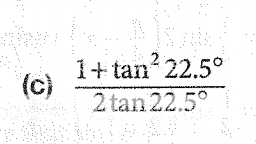kawaiipotato
Well-Known Member
- Joined
- Apr 28, 2015
- Messages
- 463
- Gender
- Undisclosed
- HSC
- 2015
Re: HSC 2015 3U Marathon
dy/dx = x/2a ==> dy/dx (at x = 2ap) = p
Hence, tangent at P : y - ap^2 = p (x-2ap)
y = px - ap^2
Similarly, tangent at Q: y = qx - aq^2
Subtracting, px - qx - ap^2 + aq^2 = 0
(p-q)x = a(p-q)(p+q)
x = a(p+q)
Substituting x = a(p+q) into one of the equations:
y = apq
Intersection (a(p+q),apq)
dy/dx = x/2a ==> dy/dx (at x = 2ap) = p
Hence, tangent at P : y - ap^2 = p (x-2ap)
y = px - ap^2
Similarly, tangent at Q: y = qx - aq^2
Subtracting, px - qx - ap^2 + aq^2 = 0
(p-q)x = a(p-q)(p+q)
x = a(p+q)
Substituting x = a(p+q) into one of the equations:
y = apq
Intersection (a(p+q),apq)












